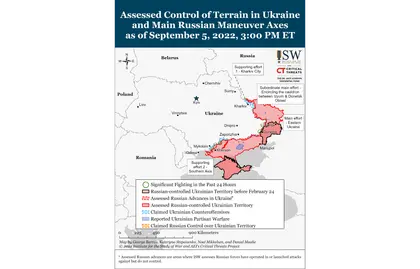Key Takeaways
- The Ukrainian counteroffensive is tangibly degrading Russian logistics and administrative capabilities in occupied southern Ukraine.
- Putin publicly praised DNR and LNR forces (and denigrated the Russian military) on September 5, likely to motivate proxy recruitment and reframe Russian coverage of the war.
- Ukrainian military officials maintained their operational silence regarding the progress of the Ukrainian counteroffensive but reported on the further destruction of Russian ground lines of communication (GLOCs) in Central Kherson Oblast.
- Russian forces conducted ground attacks east of Siversk, northeast and south of Bakhmut, and along the northwestern outskirts of Donetsk City.
- Ukrainian special forces conducted a limited operation against a Russian FSB base in the Enerhodar area.
- Power unit No. 6 of the ZNPP became disconnected from the Ukrainian power grid.
- Russian authorities continue to seek unconventional sources of combat power and are increasingly turning to ill and infirm individuals.
- Occupation authorities set a 1.25 ruble/1 hryvnia exchange rate in Zaporizhia Oblast in order to facilitate the economic integration of occupied Zaporizhia into the Russian Federation.
The Ukrainian counteroffensive is tangibly degrading Russian logistics and administrative capabilities in occupied southern Ukraine. As ISW has previously reported, Ukrainian officials explicitly confirmed that Ukrainian troops seek to attrit Russian logistical capabilities in the south through precision strikes on manpower and equipment concentrations, command centers, and logistics nodes.[1] These counteroffensive actions also have intentional radiating effects on Russian occupation authorities. The head of the Kherson Oblast occupation regime, Kirill Stremousov, told Russian media outlet TASS that his administration has paused annexation referendum plans in Kherson Oblast due to “security” concerns.[2] The Ukrainian Resistance Center similarly reported that Russian occupation authorities are abandoning plans for referenda due to the ongoing counteroffensive.[3] Shortly after TASS published his comment, Stremousov posted on Telegram denying he called for a pause because his administration had never set an official date for the referendum.[4] Both of Stremousov’s statements indicate a high level of disorganization within occupation regimes that is likely being exacerbated by the effects of the counteroffensive. Ukrainian forces intend to slowly chip away at both Russian tactical and operational level capabilities in Kherson Oblast, and in doing so will likely have significant impacts on the administrative and bureaucratic capabilities of occupation officials.

Polish FM Calls For Restoration of Ukraine’s Pre-War Borders
JOIN US ON TELEGRAM
Follow our coverage of the war on the @Kyivpost_official.
Putin publicly praised DNR and LNR forces (and denigrated the Russian military) on September 5, likely to motivate proxy recruitment and reframe Russian coverage of the war. Russian President Vladimir Putin stated on September 5 that personnel in the 1st and 2nd Army Corps (the armed forces of the DNR and LNR) are fighting better in Donbas than professional Russian soldiers and insinuated that he is unhappy with the performance of the Russian Ministry of Defense.[5] Putin’s comments are likely intended to promote recruitment and force generation in the DNR and LNR and refocus coverage of the war in the Russian media space away from the fighting in southern Ukraine. Russian forces have increasingly relied on DNR and LNR personnel as core fighting forces, and the Kremlin likely seeks to rhetorically elevate their role in the war to enhance recruitment and increase morale. Putin additionally likely seeks to elevate the Kremlin’s preferred (and false) narrative of its invasion of Ukraine as an effort to “protect” the DNR and LNR by praising their forces.
Authors: Kateryna Stepanenko, Karolina Hird, Angela Howard, and Mason Clark
See the full report here.
You can also highlight the text and press Ctrl + Enter






